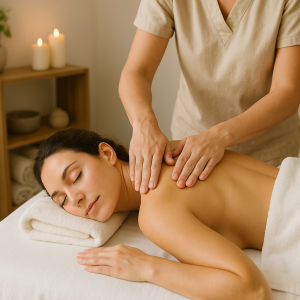 If you struggle with sleep, you’re not alone. Millions of people have a hard time falling asleep, staying asleep, or waking up feeling refreshed. While there are many ways to improve sleep, such as cutting back on caffeine or setting a regular bedtime, massage therapy is gaining attention as a possible solution. But does it actually help? Here’s what the research says.
If you struggle with sleep, you’re not alone. Millions of people have a hard time falling asleep, staying asleep, or waking up feeling refreshed. While there are many ways to improve sleep, such as cutting back on caffeine or setting a regular bedtime, massage therapy is gaining attention as a possible solution. But does it actually help? Here’s what the research says.
The Link Between Massage and Sleep
Massage therapy is most commonly known for easing muscle tension and reducing stress. However, over the last decade, researchers have been examining its impact on sleep quality more closely. So far, the findings are promising, and those seeking better rest may benefit from exploring massage therapy Olympia WA services that combine relaxation with clinical benefits.
Massage works by calming the nervous system, which plays a crucial role in regulating sleep. When you receive a massage, your body releases serotonin and reduces cortisol, the stress hormone. This shift can help your body relax and transition into deeper stages of sleep.
A 2010 study in the Journal of Clinical Rheumatology found that massage therapy helped fibromyalgia patients sleep better and feel less pain and anxiety. Another small study in Sleep Science showed that back massages helped elderly people with insomnia fall asleep faster and sleep longer.
How Massage Affects the Body
Massage doesn’t just feel good—it changes your body chemistry in ways that promote sleep. Gentle massage boosts serotonin, which helps your body make melatonin—the hormone that regulates sleep.
Massage activates the parasympathetic nervous system—the body’s ‘rest and digest’ mode that calms stress. In other words, massage helps your body switch from a state of alertness to one of calm, which is precisely what you need before bed.
Physically, massage may also reduce pain and discomfort that could otherwise disrupt sleep. People with chronic pain conditions, migraines, or tension headaches often report better sleep after regular massage sessions. That’s likely because pain is one of the most common reasons people wake up during the night.
What Type of Massage Works Best?
There isn’t one “best” type of massage for sleep, but some styles are more relaxing than others. Swedish massage, for example, uses long, flowing strokes and is designed to promote general relaxation. This makes it a good choice if your goal is to improve your sleep.
Shiatsu and reflexology have also been studied for their effects on sleep. These methods apply pressure to specific points to restore balance and support healing. Some people find them just as effective, especially if they’re looking for an alternative to traditional massage styles.
Aromatherapy massage—where essential oils like lavender or chamomile are used—may offer extra benefits.
Can You Give Yourself a Massage?
You don’t have to visit a spa or hire a professional to get the benefits of massage. Simple self-massage techniques—such as rubbing your neck, shoulders, or feet—can also help calm your body before bedtime.
Some people use tools like foam rollers or massage balls to release tight muscles. Others invest in massage chairs or handheld massagers for convenience. Just 5–10 minutes of gentle self-massage before bed can signal to your body that it’s time to relax.
What to Keep in Mind
Massage can improve sleep, but it works best alongside healthy habits like limiting screen time, keeping a regular schedule, and having a calming bedtime routine.
Also, the effects of massage can vary from person to person. Some people may feel deeply relaxed immediately, while others may need several sessions to notice a difference.
The Bottom Line
The science isn’t perfect, but it’s clear: massage therapy can help improve sleep for many people. Whether it’s reducing stress, easing pain, or simply helping you relax, the benefits are real—and increasingly backed by research.
If you’re having trouble sleeping and are looking for a non-drug option, massage might be worth a try. Even occasional sessions help your body and mind settle into better rest.
